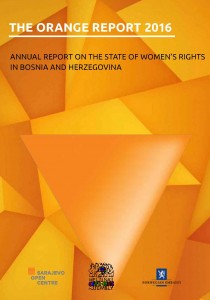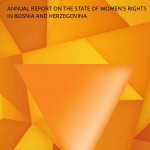 The irresponsible attitude of institutions towards the financing
The irresponsible attitude of institutions towards the financing
of safe houses in the Federation of BiH
The legislative framework for the systematic fight against domestic violence and violence against women has been improved following the adoption of the new Law on Combating Domestic Violence in the Federation of BiH 2013. Article 35 of the Law posits that the Federation of BiH and the cantons will fund safe houses in a 70-30 split (70% of the expenses will be covered by the Federation of BiH and 30% by the cantons). The Law imposes a clear obligation to pass sub-legislation which would regulate the establishment, work and financing of the safe houses, and which would set standards for accreditation of safe houses and their eligibility for state support. Unfortunately, this obligation has not been met in the last three years and so the work of the six existing safe houses has been left to self-regulation. The existing safe houses have independently conducted an assessment of the annual costs of running a safe house. It is estimated that the work and the programs of one safe house with the capacity of 25 places costs a minimum of 240,000 KM a year. On the other hand the support for the safe houses on state level, from the Federation of BiH Government, from 2008 until now has never surpassed 200,000 KM. Therefore, one can conclude that the allocated 200,000 KM can only cover the costs of one safe house in the Federation of BiH, and that if this is split between the six safe houses each can only get an amount that covers between 10-15% of each safe house’s total expenses. The Government of the Federation BIH has therefore been in breach of the law for years and has failed to meet its obligation to finance 70% of the safe house expenses.
Instead of addressing this issue seriously the Government of the Federation of BiH has decided to amend Article 35 in 2015, arguing that the existing provision is ‘unclear.’ Without asking the Parliament FBiH for the interpretation of the contentious Article the Government suggested that in the future safe houses can only be ‘institutions’ (according to the 1993 and 1994 Law on Institutions) and that their coming funding will be allocated according to the number of people settled there, based on the pre-determined cost of accommodation. The existing safe houses, which are foundations or citizen associations, have to change their legal personality into that of an institution, or they will not be able to get the government funding. The Government FBiH has addressed the wrong issue – the legal status of the safe houses, instead of focusing on the sub-legislative acts and its obligation to cover 70% of the funding expenses. In December 2015 the Changes and Amendments to the Law Combating Domestic Violence FBiH have been submitted to the Parliament, without a public consultation process. The consultation process will be conducted only because the civil society organizations pressured the Parliament into opening up the process.
It is important to point out that this is addressed well in Republika Srpska, in the sense that the safe houses still have the status of a foundation or an association and that they are, as such, entered into the register of safe houses of the Government of RS and so receive 70% of their funds from the Government. This is a clear example that safe houses do not need to have the legal personality of an institution.
In addition to the suggested legal changes, it is disconcerting that in 2015 the Government of the Federation of BiH has not set aside a single KM towards the existing safe houses. A budget of only 160,000 KM for all of the six safe houses in the Federation has been passed for 2016, which does not cover even a 70% of funding for a single safe house. A safe house in Mostar, ran by Žena BiH, has been on the verge of closing for months, unable to accept the victims of violence, due to the Government carelessness.[1]
Inequality faced by women in the formation of governments at all levels
The General Election in October of 2014 resulted in the formation of Parliaments at all levels of government, the establishment of the Cantonal and Entity governments and the Council of Ministers BIH followed in 2015.
And, similarly to the results of every General Election in the last 20 years (from the first post-war election in 1996 until today) the formed governments do not have the minimal required number of female ministers in their establishment. Cantons, entities and the State have yet again breached the international standards set by the UN CEDAW Committee and the Council of Europe, and the Bosnian and Herzegovinian legal requirement of at least 40% of the less represented gender in the Executive, prescribed in Art. 20 of the Gender Equality Law BiH.
Although the Council of Ministers BiH has two female ministers (and seven male ministers) for the first time after two mandates, which has taken us out of the group of countries like Saudi Arabia, or Pakistan that do not have a single woman in government, it is important to emphasize that at other levels of the government, like the Government of Republika Srpska the number of female ministers has gone down. The worst examples are the Government of the Zeničko-Dobojski Canton and the Government of the Hercegovačko-Neretvanski Canton, which do not have a single female minister and are instead single-sex executive bodies.
This is clear proof that legislative norms need to be tightened and that gender quotas need to be introduced in the laws regulating the Executive, specifically, in the laws which regulate the election of governments on all levels, in order to stop the future formation of governments which do not have an equal number of men and women. It is encouraging that the Commission for Gender Equality of the House of Representatives of the Parliament BiH has accepted the proposal made by the Sarajevo Open Centre and the Gender Equality agency BiH at the special parliamentary session in September 2015. The House of Representatives has put the Amendments to the Law on the Council of Ministers BiH in the parliamentary procedure in December of 2015. This Law will be on the agenda in the House in February 2016. If the amendments are passed, the Council of Ministers will not be formed after the 2018 General Election, unless (and until) it satisfies the 40% gender quota requirement.[ii]
You can find the Orange Report 2016 – Annual Report on the State of Women’s Rights in BiH following this link.
—
[1] Sarajevo Open Centre and Medica Zenica have conducted an analysis on the topic of formation and financing of safe houses which was published in December 2015. Available at:
http://soc.ba/site/wp-content/uploads/2015/12/HRP_sigurne-kuce_final_10.12.2015._za-web-1.pdf
[ii] Overview of recent developments:
 The Orange Report 2016 – Annual Report on the State of Women’s Rights in Bosnia and Herzegovina
The Orange Report 2016 – Annual Report on the State of Women’s Rights in Bosnia and Herzegovina